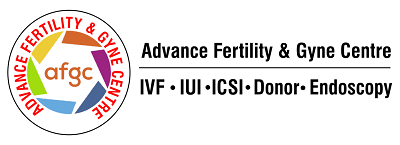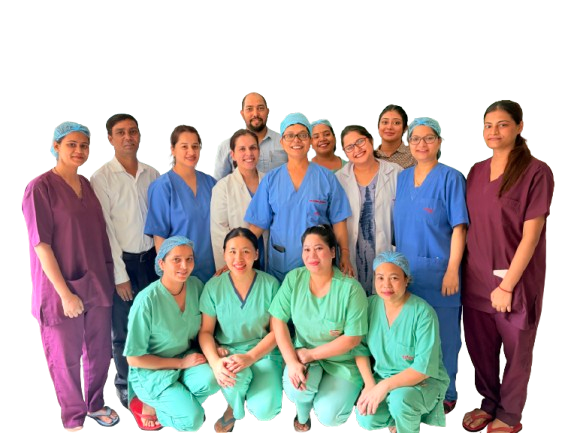Best IVF Centre in Noida
ADVANCE GYNAECOLOGY & FERTILITY CENTER
C1 Sector 26 Opposite Pillar No. 18 of Noida Bypass Flyover, Noida, Uttar Pradesh – 201301
Phone: +91-9871250235
Dr. Kaberi Banerjee is available for consultations on appointment basis at the Noida clinic. Follicle monitoring and injections can be organised from the Noida clinic. There is a coordinator available at the clinic who will coordinate all blood tests, ultrasounds and injections.
IVF Treatment in Noida
Many couples today face challenges with conceiving due to factors such as delayed marriages, health issues, and genetic conditions, making natural conception difficult. In such cases, IVF becomes a valuable solution. As one of the most widely used forms of infertility treatment, IVF is an assisted reproductive technology that helps couples achieve parenthood. This technique involves fertilizing sperm and eggs outside the body in a controlled laboratory environment. If you’re seeking the best IVF treatment, Advance Fertility & Gynecological Centre, Noida is a name you can trust. Led by a renowned fertility specialist with decades of experience and a dedication to excellence in reproductive medicine, it offers top-notch care and expertise.
Book Appointment
What is IVF Treatment?
IVF, or In Vitro Fertilization, is a medical procedure designed to assist childless couples or single women in conceiving a child. It involves a complex series of steps to facilitate reproduction.
Infertility is a prevalent concern for couples, affecting their ability to conceive due to various factors, which may include issues with either partner or both. Causes of infertility can range from genetic factors and environmental influences to ovulation disorders, blocked fallopian tubes, damage to the hypothalamus or pituitary gland, premature ovarian failure, low sperm count, or azoospermia. However, advancements in IVF technology have significantly improved the chances of conception. Typically, an IVF treatment cycle lasts about three weeks.
In IVF, eggs and sperm can be sourced from you or from anonymous donors. While it is recognized as a highly effective method for achieving pregnancy, several factors can impact the likelihood of conception and a healthy birth, including the couple’s age and the specific infertility issue. Additionally, transferring multiple embryos can increase the risk of multiple pregnancies.
Who Can Benefit from IVF Treatment?
Best IVF clinic in Noida Individuals struggling to conceive and those who may be candidates for the procedure include
- IVF is a suitable treatment for women with fallopian tubes that are either blocked or damaged. It can be attributed to the fact that during the IVF procedure the fallopian tubes are not used.
- Unexplained Infertility
- Women with Endometriosis and Adenomyosis
- Women with diminished ovarian reserve requiring oocyte donors
- A study involving patients with PCOS and infertility found that IVF is effective for women with Polycystic Ovarian Syndrome. During the IVF cycle, fertility medications are prescribed to enhance egg quantity and quality, ensuring regular and reliable ovulation.
- While IVF is primarily used to address increased infertility among women, it also offers benefits for men with low sperm count. Unlike some treatments, IVF does not focus on the quantity of sperm, making it a suitable option for men with reduced sperm levels.
- Healthcare can remain highly effective by utilizing donor sperm if the male partner is unable to produce healthy sperm despite using fertility medications.
IVF Treatment Procedure at Advance Fertility & Gynecological Centre
Dr. Kaberi Banerjee addresses a wide range of infertility issues daily at Advance Fertility & Gynecological Centre. As the top IVF treatment center in Noida, we provide the following services
- Marital therapy for infertile couples who have had poor results from IVF.
- Direction and encouragement to the patient as they make their decision.
- Ensure that the entire treatment process is managed by a single practitioner or a consistent practice.
- This means that each patient undergoing IVF treatment will have a dedicated team assigned to them.
- An IVF center fully compliant with all legal and international regulations in this field
- Most modern growing chambers and andrology equipment are received at Spermatogonium.
Success Rates of Advance Fertility & Gynecological Centre
At Advanced Fertility & Gynecological Centre, Noida, the current success rate for IVF treatment averages 85% and continues to improve due to ongoing advancements in the field. However, it’s important to recognize that the effectiveness of IVF is influenced by various factors.
About Dr. Kaberi Banerjee
Fertility physician and the best IVF Specialists in Noida, Dr. Kaberi Banerjee is a highly skilled and knowledgeable specialist based in South Delhi. Her clinic, Advance Fertility & Gynecological Centre, located in Lajpat Nagar, Delhi. Dr. Banerjee completed her MD and MBBS in Obstetrics and Gynecology at the All India Institute of Medical Sciences in New Delhi. Additionally, she has received specialized training in infertility treatment at St Thomas’ Hospital in London, renowned for its programs in this field.
With over a decade of experience, Dr. Kaberi Banerjee, the medical director of Advance Fertility & Gynecology Centre, has successfully overseen more than 10,000 IVF pregnancies each year. The success rates at the centre reflect the expertise of Dr. Banerjee, who has effectively managed complex cases, including those involving surrogates, donors, and repeated IVF failures.
Dr. Kaberi Banerjee is a senior IVF specialist with extensive experience working in several leading corporate hospitals in Delhi. She also serves as the organizational chairperson of CUPART (Current Practices and Recent Advances in ART), an organization dedicated to advancing research and promoting best practices in fertility and IVF. In 2011, Dr. Kaberi Banerjee established the CUPART framework.”
FAQs
- Is IVF successful on the first try?
While success rates can vary due to factors such as age, diagnosis, and treatment plan, recent research suggests that the success rate for first-time IVF procedures typically ranges between 30% and 40%.
- Which age is best for IVF?
There’s a consensus that the late 20s to early 30s serve as the golden window for IVF treatment.
- Which month is best for IVF?
Spring is often associated with renewal and rejuvenation, making it an appealing season for many couples considering IVF treatment.
- Is IVF safe?
IVF is generally considered a very safe process and people who have undergone the process have experienced no problem with their health or pregnancy.
- How many injections for IVF treatment?
1 to 2 injections are often required each day. You may need to take these injections for a different number of days during ovarian stimulation; usually it ranges from 8 to 14 days or longer.
Infertility Treatment Centre
Why Choose Us?
We care for each one of the innumerable people who come to us with hope in their hearts. For some of them we are the last resort. We do not disappoint.
- Our Centre specializes in treating couples who have had failed IVF cycles.
- Educating patients so that they can take informed decision.
- Entire treatment under one roof
- Policy of one patient - one team, very crucial to IVF success
- IVF lab strictly as per international guidelines
- Spermatorium with cutting edge andrology and culture room facilities
We offer a variety of solutions
Our Treatments
Advance Fertility, Infertility Treatment Centre offer the complete range of infertility related treatments such as IVF, IUI, ICSI, Gynecological Surgery, Donor Gametes and Surrogacy Service in Delhi NCR.

In Vitro Fertilization (IVF)

IUI – Intra Uterine Insemination

Donor Gametes

Gynecological Surgery

Infertility Treatment in Males

Infertility Treatment in Females

Intracytoplasmic Sperm Injection


